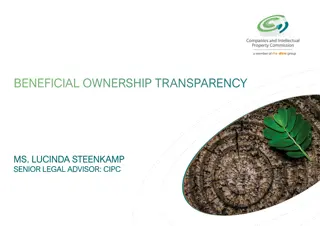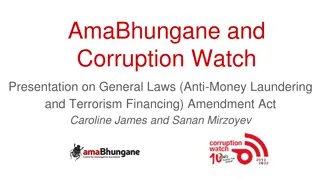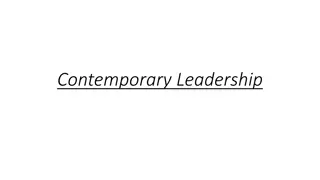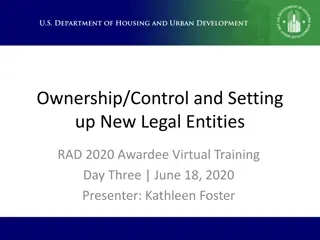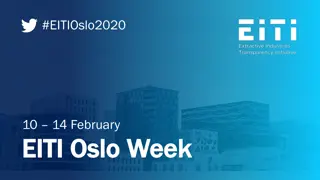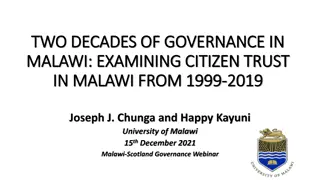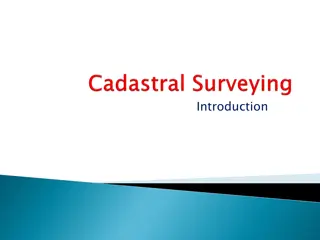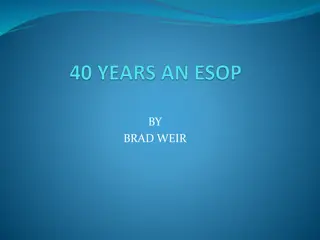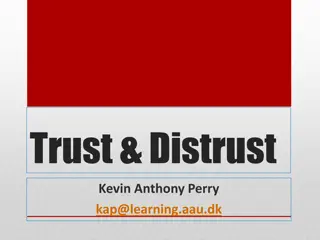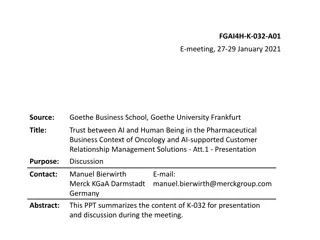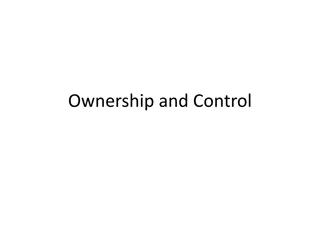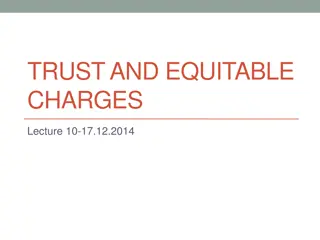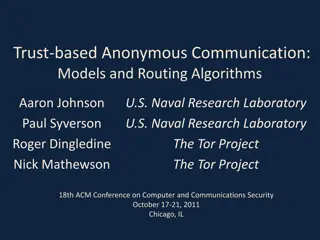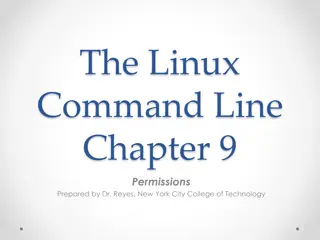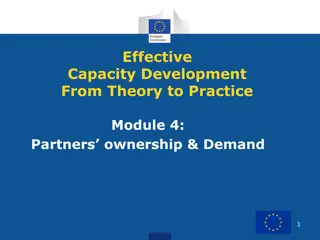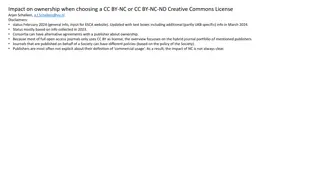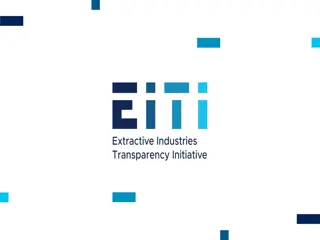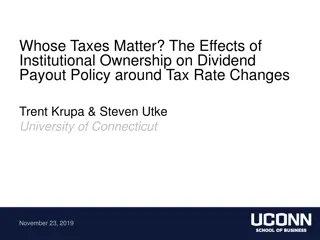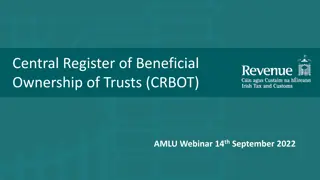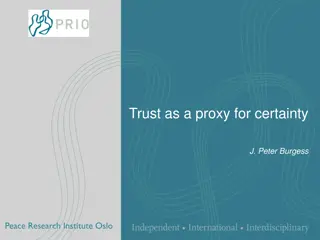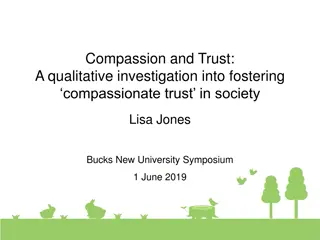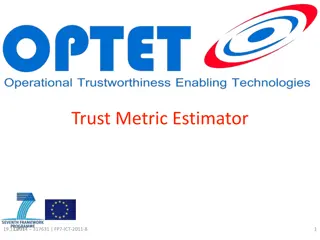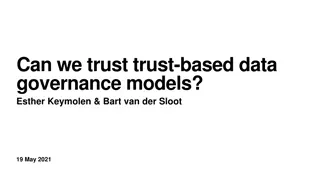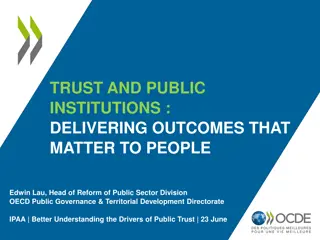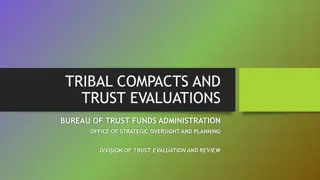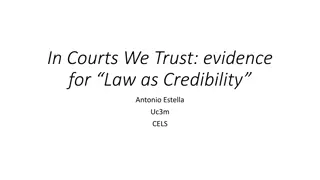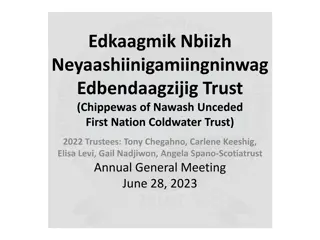Enhancing Beneficial Ownership Transparency: CIPC's Response to FATF Requirements
The Companies and Intellectual Property Commission (CIPC) in South Africa has taken significant steps to address deficiencies highlighted by the Financial Action Task Force (FATF) by establishing a Beneficial Ownership Register. Through this register, CIPC aims to collect accurate information on ben
1 views • 17 slides
BENEFICIAL OWNERSHIP TRANSPARENCY
South Africa's CIPC is addressing deficiencies in beneficial ownership transparency, as highlighted in the October 2021 Mutual Evaluation Report. The country faces increased monitoring due to being placed on the FATF Grey List. CIPC is mandated to establish a Beneficial Ownership Register to ensure
0 views • 16 slides
GRONDDELEN democratiseert grondbezit - Korte introductie en overwegingen
GRONDDELEN is working towards democratizing land ownership in the Netherlands, particularly focusing on agricultural land. The initiative aims to involve citizens in land ownership and management, highlighting the benefits of collective ownership and investment. The rise in interest in nature-inclus
4 views • 15 slides
Securitization of Covid-19 in Hong Kong: Trust and Success
Analyzing the successful securitization of Covid-19 in Hong Kong amidst low political trust, this study explores the role of trust, smart technologies, and governmental factors in managing the pandemic. Key elements include political trust, audience acceptance, smart technology trust, and effectiven
2 views • 19 slides
Enhancing Anti-Money Laundering Laws for Beneficial Ownership Transparency
Presentation by AmaBhungane and Corruption Watch focuses on amending laws to define and disclose beneficial ownership in South Africa, emphasizing the need for clear definitions, low thresholds, and a risk-based approach. Recommendations include a consolidated register, stronger sanctions for compli
1 views • 9 slides
Understanding Trust in Contemporary Leadership
Trust is the foundation of effective leadership, comprising elements like integrity, competence, consistency, loyalty, and openness. Trust plays a crucial role in leadership, impacting team performance and cooperation. Different types of trust - deterrence-based, knowledge-based, and identification-
0 views • 9 slides
Legal Entities and Ownership Control in RAD Awardee Training
Explore the nuances of ownership, control, and legal structures in the context of RAD 2020 Awardee training, covering topics such as governing corporations laws, unique ownership requirements, RAD statutes, and implications of ownership changes. Learn about the RAD Ownership/Control Matrix and third
0 views • 28 slides
Understanding Shamilat-e-Deh: Common Village Land Ownership in Pakistan
Shamilat-e-Deh refers to common village land in Pakistan jointly owned by landowners for community purposes. This traditional system dates back to British rule in the subcontinent and involves shared ownership of resources like mosques, schools, and grazing lands. Landowners' shares in Shamilat are
1 views • 16 slides
Understanding Beneficial Ownership Requirements in EITI Standards
The EITI Standard requires countries to disclose the beneficial ownership information of oil, gas, and mining companies by January 2020. This includes details of the beneficial owner's identity, nationality, and any politically exposed status. Maintaining a public register of beneficial owners is re
0 views • 13 slides
Examining Citizen Trust in Malawian Governance Over Two Decades (1999-2019)
This paper critically analyzes public trust in key government institutions in Malawi from 1999 to 2019, highlighting a general decline in trust levels and its impact on political legitimacy. The study explores factors influencing public trust, such as perceptions of government performance, integrity
0 views • 12 slides
Understanding Cadastre and Cadastral Surveying
Cadastre is a system containing land information, while cadastral surveying involves defining property boundaries and land ownership rights. Cadastral surveys subdivide land parcels for ownership and document property ownership with geometric descriptions. Real property ownership denotes the authori
2 views • 17 slides
Cooperative Ownership and Democratic Participation in Economic Models
Explore the principles of cooperative ownership, democratic participation, and economic models as advocated by Jessica Gordon-Nembhard. She emphasizes the historical significance of collective work, indigenous cooperative efforts, and the values of shared risk and surplus sharing in community-owned
0 views • 71 slides
Leadership, Trust, and Crisis: Lessons from Central Europe Project
The project funded by multiple governments in Central Europe aims to advance sustainable regional cooperation. The initiative focuses on understanding leadership as a process involving trust, especially in crisis situations. The lesson structure includes case studies, discussions on resources, and e
4 views • 19 slides
Understanding ESOP: Ownership Structures, Basics, and Culture
Exploring the Employee Stock Ownership Plan (ESOP) in depth, covering ownership structures including family-owned, partnerships, and outside investors. Delve into ESOP basics such as ERISA and Department of Labor regulations, as well as the structure involving trustees, Board of Directors, and compa
0 views • 7 slides
Exploring Trust and Distrust in Social Interactions
Understanding the dynamics of trust and distrust within social interactions is vital for successful service delivery and relationship-building, especially in youth work settings. This case study highlights the complexities of gaining trust, the significance of trusting relationships, and the cultura
1 views • 50 slides
Understanding Academic Journals: Ownership, Operations, and Processes
Explore the inner workings of academic journals, including ownership by the academic community, key operational structures, and the review process timeline. Gain insights into reputable vs. predatory publishers, implications of ownership, and the roles of editors, reviewers, and policy boards.
0 views • 17 slides
Trust Dynamics in AI-Powered Pharmaceutical Business: A Critical Analysis
Exploring the intricate relationship between AI and human trust in the context of the pharmaceutical industry, this presentation delves into the factors influencing trust dynamics and proposes implementation strategies to foster trust between sales representatives and oncologists in AI-supported too
2 views • 12 slides
Comparison of Ownership Concepts in the Iraqi and Louisiana Civil Codes
The preliminary part of the Iraqi Civil Code recognizes various rights in rem, including ownership, disposal, usufruct, use, habitation, servitudes, and leases. It details the concept of ownership, perfect ownership rights, and additional rights such as "surface right" and tasarruf. The Iraqi Code a
0 views • 5 slides
Benefits and Challenges of Public Ownership of Utilities
Public ownership of utilities offers economic gains, democratic control, and addresses public interest objectives such as renewable energy and affordability. This model presents opportunities for cost savings, local economies, and transparent planning. However, challenges like debt accumulation and
1 views • 15 slides
Strengthening National Ownership of Immunization Programs through Parliamentary Engagement
Strengthening national ownership of immunization programs is crucial for ensuring effective and quality vaccination services for all. This involves generating political commitment, enhancing community awareness, addressing vaccine hesitancy, and improving system capabilities. National ownership is e
0 views • 18 slides
Ownership and Control Regulations in ASEAN Air Transport Industry
The content discusses ownership and control restrictions in the air transport industry across ASEAN countries, outlining foreign ownership limits and regulations. It highlights the need for liberalization to align with the ASEAN Comprehensive Investment Agreement (ACIA). Various ownership models are
0 views • 4 slides
Understanding Trust and Equitable Charges in Property Law
Trust and equitable charges in property law involve a legal obligation where the property holder manages the property for the benefit of another person. This trust relationship consists of elements like legal title, trust property, and beneficiaries. The creators of a trust can be referred to as set
0 views • 25 slides
Trust-Based Anonymous Communication Models and Routing Algorithms
This research paper discusses trust-based anonymous communication models and routing algorithms in the context of onion routing, emphasizing the importance of trust in mitigating security risks from adversaries with resources. The paper presents a model of trust and proposes trust-based routing algo
0 views • 65 slides
Ownership in France: Civil Law and Key Attributes
Exploring ownership in France under Civil Law, this content delves into the rights and characteristics associated with ownership, including the right to enjoy, dispose of property, and the protection mechanisms available. It covers key concepts such as Usus, Fructus, and abusus, along with legal pri
0 views • 11 slides
Understanding File Permissions and Ownership in Linux
This content discusses the concept of file permissions and ownership in Linux, covering the three levels of ownership (owner, group, everybody), the usage of the 'ls -l' and 'id' commands to check identity information, changing file permissions using the 'chmod' command with octal notation, and meth
0 views • 5 slides
Understanding Partner Ownership and Demand in Capacity Development
This module delves into the significance of ownership in capacity development (CD) initiatives, highlighting challenges faced and solutions. It emphasizes the importance of partner commitment and ownership to drive successful change processes. The content explores various perspectives on ownership a
0 views • 18 slides
Impact of CC BY-NC or CC BY-NC-ND Licenses on Ownership
Understanding the impact on ownership when choosing between CC BY-NC or CC BY-NC-ND Creative Commons licenses in academic publishing. Different publishers have varying policies on ownership transfer, re-use rights, and commercial usage. Authors may need to consider these factors carefully before sel
0 views • 5 slides
Islamic Finance Task Team on Economic Ownership of Non-Financial Assets
This task team focuses on determining the economic ownership of non-financial assets in Islamic finance practices like sales, lease, and equity financing. Recommendations are being developed to address issues related to economic ownership, including recording assets on balance sheets and handling de
0 views • 11 slides
Understanding Beneficial Ownership in Oil, Gas, and Mineral Resources Governance
Beneficial Ownership (BO) is a crucial aspect of governance in the oil, gas, and mineral sectors. Requirement 2.5 of the global standards mandates disclosure of the natural person(s) who directly or indirectly ultimately own or control a corporate entity. Elements of BO include natural persons, owne
0 views • 22 slides
Effects of Institutional Ownership on Dividend Payout Policy
This study examines how a firm's ownership structure, particularly institutional ownership, influences its dividend policy around tax rate changes. It explores the impact of tax-sensitive/insensitive institutional ownership, the role of dedicated institutions as monitors, and the interaction between
1 views • 26 slides
Understanding Central Register of Beneficial Ownership of Trusts (CRBOT) AMLU Webinar
CRBOT, established in accordance with EU AML regulations, aims to increase transparency in beneficial ownership of trusts. Trustees must maintain two registers with identical information and ensure due diligence in disclosing trust ownership. Designated persons have access to the register for checks
0 views • 10 slides
Enhancing Transparency in Company Ownership: UK Legislation and Public Registers
Tim Moss, Chief Executive of Companies House, and other officials highlight the importance of beneficial ownership transparency in UK companies. The UK legislation mandates the maintenance of a Register of People with Significant Control (PSC Register), ensuring information on individuals controllin
0 views • 15 slides
Trust as a Proxy for Certainty in Social Cohesion
Exploring the intricate relationship between trust, security, and social cohesion, this study delves into how trust serves as a proxy for certainty in uncertain environments. By analyzing societal properties and the role of trust in managing risks and insecurities, the Peace Research Institute Oslo
0 views • 16 slides
Cultivating Compassionate Trust in Society: A Qualitative Exploration
This qualitative investigation delves into the concept of compassionate trust and its role in fostering positive societal interactions. Through a social constructionist lens, the study explores how individuals understand and embody compassionate trust, emphasizing the interconnectedness of compassio
0 views • 16 slides
Trust Metric Estimator: Computational Model for Trustworthiness Assessment
The Trust Metric Estimator project aims to create a computational model to estimate user trust levels towards system performance over time. It considers social and technical factors, integrating trust, trustworthiness, and economic aspects to aid decision-making. Research includes surveys to identif
2 views • 8 slides
Trust-Based Data Governance Models and Their Impact on Personal Data Regulation
This article delves into trust-based data governance models, contrasting them with control-based models in the context of personal data regulation. It explores the challenges and benefits associated with both approaches, emphasizing the emergence of new models centered on trust such as data stewards
0 views • 11 slides
Building Trust in Public Institutions: Insights and Strategies
Public trust in government institutions is declining in many OECD countries. Existing measures of trust often reflect leadership approval. Satisfaction with public services plays a crucial role in fostering trust. Investing in trust involves focusing on governance drivers and actions that enhance tr
0 views • 15 slides
Trust Evaluation Process in Tribal Compacts and Trust Funds Administration
Trust Evaluations are mandated under the Tribal Self Governance Act for Tribes engaging in trust programs. The Bureau of Trust Funds Administration conducts these evaluations, focusing on compliance with federal laws and safeguarding trust assets. The process includes questionnaires, reviews, and re
0 views • 13 slides
Trust Dynamics in Political Relationships: Evidence and Implications
Exploring the intricate dynamics of trust between Principals and Agents in political relationships, this study delves into the implications of mistrust and the shift in trust levels over time. Utilizing surveys on political trust and data on trust in governmental branches, the analysis sheds light o
0 views • 22 slides
Edkaagmik Nbiizh Neyaashiinigamiingninwag Trust Overview
Edkaagmik Nbiizh Neyaashiinigamiingninwag Trust, established in 2012 by Chippewas of Nawash Unceded First Nation Coldwater Trust, aims to benefit the First Nations community through various initiatives such as land acquisition, education advancement, and cultural preservation. The Trust is managed b
0 views • 15 slides

